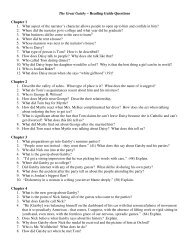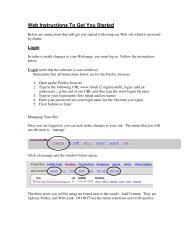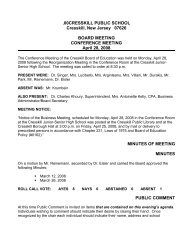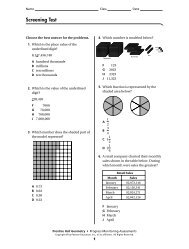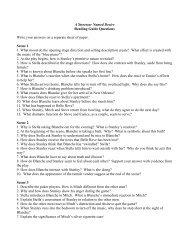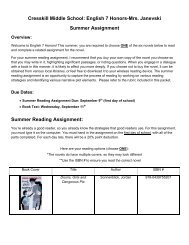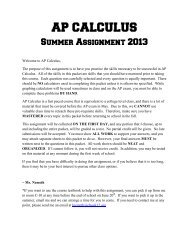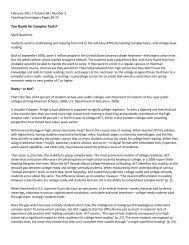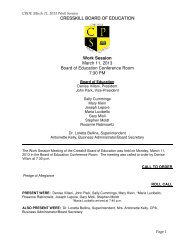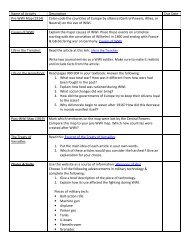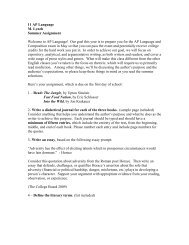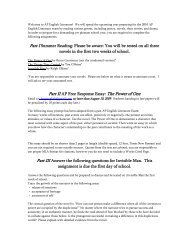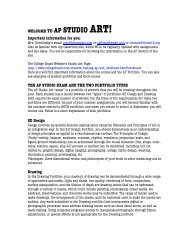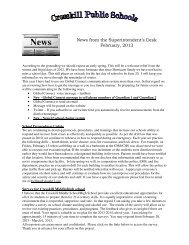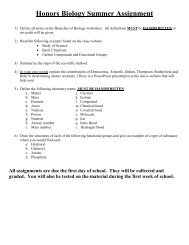Hamlet Questions (pdf)
Hamlet Questions (pdf)
Hamlet Questions (pdf)
You also want an ePaper? Increase the reach of your titles
YUMPU automatically turns print PDFs into web optimized ePapers that Google loves.
4. Discuss the tone of <strong>Hamlet</strong>’s letter to Ophelia<br />
5. What is <strong>Hamlet</strong>’s purpose in talking to Polonius about the Sun’s breeding maggots in a dead dog?<br />
What does Polonius’ reaction (in asides) reveal?<br />
6. How do Rosencrantz and Guildenstern analyze <strong>Hamlet</strong>’s madness?<br />
7. <strong>Hamlet</strong> says to Rosencrantz and Guildenstern about their coming to see him, “I will tell you why; so<br />
shall my anticipation prevent your discovery.” What does this last phrase mean?<br />
8. What does <strong>Hamlet</strong> tell Rosencrantz and Guildenstern is the cause of his problem?<br />
9. <strong>Hamlet</strong> tells Polonius that he ought not to treat the players according to their desserts but much better;<br />
that is, according to what?<br />
10. What does “catch” mean in the last line of the act? What is <strong>Hamlet</strong> planning on doing?<br />
ACT III<br />
Scene 1<br />
1. What reasons do Claudius and Polonius give for becoming “lawful espials” to the meeting of <strong>Hamlet</strong><br />
and Ophelia?<br />
2. <strong>Hamlet</strong>’s most famous soliloquy (and perhaps Shakespeare’s most famous lines) begins, “To be or not<br />
to be…” Paraphrase the speech. In summary, why does <strong>Hamlet</strong> decide that to kill himself would<br />
be too risky? In what ways does the speech reflect <strong>Hamlet</strong>’s central problem in the play?<br />
3. Why does <strong>Hamlet</strong> urge Ophelia, “Get thee to a nunnery”? What are the two possible meanings?<br />
4. What lines suggest to you that <strong>Hamlet</strong> is aware that his conversation with Ophelia is being heard by<br />
eavesdroppers? If he senses their presence, what purpose might he have in what he says to<br />
Ophelia?<br />
5. How does Ophelia react to this interview with <strong>Hamlet</strong>?<br />
6. What conclusions does the King draw from what he overheard?<br />
Scene 2<br />
1. What is the purpose of drama, according to <strong>Hamlet</strong>?<br />
2. What does <strong>Hamlet</strong> most admire about Horatio’s character?<br />
3. How long has <strong>Hamlet</strong>’s father been dead when <strong>Hamlet</strong> and Ophelia discuss the matter before the play<br />
begins?<br />
4. What does Gertrude mean when she says “the lady doth protest too much, methinks “? What does her<br />
reaction tell us about her degree of complicity in the events that led up to her marriage to<br />
Claudius?<br />
5. Why is the play named as it is?<br />
6. What is the general tone of the comments that <strong>Hamlet</strong> makes to Ophelia before and during the play?<br />
7. How does the King react to the play?<br />
Scene 3<br />
1. Why does <strong>Hamlet</strong> not kill the King when he finds him praying? What is ironic about this inaction?<br />
Scene 4<br />
1. Why did <strong>Hamlet</strong> strike instantly at the figure behind the arras in his mother’s room?<br />
2. When <strong>Hamlet</strong> confronts his mother, how does her reaction underscore her innocence and guilt?<br />
3. What reasons does the ghost give for his second appearance?<br />
4. What does the Queen resolve to do at the end of Act III?<br />
ACT IV<br />
Scene 1<br />
1. In scene 1 of Act IV, what is the King’s major concern? In what line does he express it?<br />
2. What is the “foul disease” that the King is referring to?



